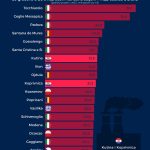April 25, 2020 – The Croatian Institute of Public Health has issued recommendations for the transportation of passengers by trams and buses in Croatia during the coronavirus pandemic.
Index.hr reports that the recommendations are in place to protect drivers and passengers, including driver’s hygiene, driving with masks, physical distance and passenger space.
The hygiene of the driver’s area and his work environment is maintained by cleaning the surfaces daily with surface disinfectant. In particular, areas that are often touched by hands such as door handles, the steering wheel, worktop, and shelf for ticketing should be cleaned.
The driver is advised to wear a mask while driving if it does not interfere with safe driving. The protective mask should be changed regularly, and always when it becomes moist and wet. If possible, passengers should wear protective masks if it does not affect their breathing.
Before and after removing the mask, hands should be washed with warm water and soap or disinfected. Used disposable masks are disposed of in garbage bags that are placed in buckets with a lid.
Regular hand hygiene is required and, whenever possible, you are to wash your hands with soap and water for 20 seconds. If this is not possible, disinfectants containing 70 percent alcohol are used.
Hands should be washed before entering and after leaving the vehicle, after cleaning the vehicle or when the hands are visibly dirty and in other recommended situations (after using the toilet, before eating, after wiping the nose).
The disinfectant must be available at the entrance to the vehicle, and at the entrance to the bus and tram, hand sanitation is required for the vehicle staff and passengers.
Hands, eyes, mouth and nose should not be touched because the virus can enter the body in this way, close contact with passengers and their luggage should be avoided when communicating with them, and a distance of one to two meters in daily social contact with passengers and others should be maintained. If drivers place luggage in the luggage compartment, then the hands should be disinfected afterward.
Passengers should be informed of the importance of maintaining a distance of at least one meter from each other. Precautions should be observed, especially if passengers with respiratory symptoms are observed.
The number and arrangement of passengers on the tram should be such as to allow the prescribed distance between them. It is advisable to limit the number of passengers in the tram to the number of seats.
On buses, the number and arrangement of passengers in the seats are such that they allow a prescribed distance between them. One person should be seated in a row so that they sit alternately in the left and right seats.
The recommendations also highlight the importance of being aware of the way the coronavirus is transmitted – when an infected person speaks, coughs or sneezes near a healthy person or by touching objects and surfaces contaminated with the respiratory secretions of an infected person, and then by touching the eyes, nose or mouth.
Therefore, it is also necessary to maintain hygiene – cover your mouth with the inside of your elbow or paper handkerchief when coughing or sneezing and then throw the handkerchief in the waste bin and wash your hands.
Regular cleaning and ventilation of the interior of the vehicle before and after driving is required. When cleaning the inside of buses and trams, special attention should be paid to window glass and handrails.
When stopping at stops, it is necessary to ventilate the passenger compartment regularly. While driving, the inside of the bus can be ventilated, but in trams and buses, it is necessary to avoid the use of air conditioning and heating.
It is recommended that windows be opened while driving, weather and temperature permitting.
Payment for tickets should be encouraged with contactless cards or bought online, and if a classic card payment or cash is used, disinfect hands after payment.
Controllers must wear a mouth and nose mask when in contact with passengers, and use disposable gloves, which must be disinfected or changed after each tram is visited, and the mask must be changed regularly as recommended.
Also, it is recommended that buses set up a physical barrier between the driver’s seat and the passenger (Plexiglas or similar), and if this is not possible, the front row of seats behind the driver will not be used to transport passengers.
If driving staff or their family members develop symptoms suggestive of COVID-19, such as fever, sore throat, coughing, difficulty breathing, they should not go to work and notify their employer immediately.
The HZJZ points out that most of the recommendations of hygiene measures can be applied to other forms of organized road transport.
The latest recommendations can be found on the HZJZ website, and recommendations for the transportation of passengers on buses and trams provide instructions for using hand sanitizer.
As of Monday, when public and suburban public transport is reintroduced, ZET in Zagreb will launch 111 bus routes according to a custom timetable.
Thus, instead of trams in traffic, there will still be bus lines operating the routes of night tram lines (31 Crnomerec – Savski most, 32 Prečko – Borongaj, 33 Gracansko Dolje – Savišće and 34 Ljubljanica – Dubec). Tramlines will be gradually established, depending on safety assessments and the condition of the lanes they cross, ZET reported on Friday.
In order to comply with epidemiological measures, it is recommended to wear protective masks, hand disinfection, and keeping a social distance.
As of Monday, April 27, public transport of passengers on scheduled routes with the payment of tickets is restored in Split, and accordingly, the transport on special lines ceases, which was free of charge with the presentation of passes or civil protection cards.
“As of Monday, all Promet d.o.o. from Split it will operate at normal business hours, and tickets will also be available on buses from the driver. As regular public transport was abolished on March 22, all passengers who purchased the March stamps have the right to travel with this ticket until Sunday, May 10. All passengers who buy a ticket for May may be stamped with number 4 instead of 5. Namely, in order to reduce operating costs, the stamp will be used which was printed for April, but due to the interruption of bus operations, they were not put on sale,” said Promet Split.
To read more about travel in Croatia, follow TCN’s dedicated page.








